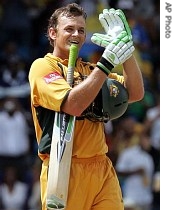2007年VOA标准英语-Influence of Australia's Cricket Boycott of Zim
搜索关注在线英语听力室公众号:tingroom,领取免费英语资料大礼包。
(单词翻译)
By Tendai Maphosa
London
17 May 2007
The Australian government's cancellation1 of its national cricket team's tour of Zimbabwe, which had been scheduled for September, has re-ignited a passionate2 debate about whether politics and sports should mix and about what happens when they do. Tendai Maphosa has more about the effects of sports boycotts4 in this report for VOA from London.
 |
| Australia's batsman Adam Gilchrist celebrates as he points to his left hand glove during the Cricket World Cup final against Sri Lanka, 28 April 2007 |
The Australians suggested playing the series in a neutral venue5, but the Zimbabwe government refused the offer, saying Australia is obliged to fulfill6 the tour and accused the Australians of politicizing sport.
A look at one of the world's major sports boycotts, the one imposed on South Africa during the apartheid era, reveals that both the Zimbabweans and the Australians have done an about face. When the boycott3 against South Africa was in force, the Zimbabwe government supported it and Mr. Howard opposed it.
Steven Friedman is an associate researcher at the Institute of Democracy In South Africa. He tells VOA that there are often double standards when it comes to sport boycotts.
"The problem is that the principles are very inconsistently applied7 so that there is currently a boycott of Zimbabwe and Zimbabwe is a tyrannical state, one concedes that, but at the same time in the cricketing world there is no boycott of Pakistan, which is also in the midst of political upheaval8 because the president Is trying to get rid of the chief justice," he said. "So people legitimately9 ask why it is appropriate in one circumstance and not in another."
But Friedman argues that sport boycotts can work if they are applied in a package along with other measures.
"If you have a very clear set of principles which you use to underpin10 the boycott it can be very effective," he added. "The most obvious example is that if you say there shouldn't be any racism11 in sport, which was used to condemn12 and boycott apartheid sport."
Ali Bacher is a former South African cricket player and administrator13. During the sport boycott of South African, he organized so-called rebel tours of the country and lured14 international cricketers to the country with money. His argument then was that sport and politics should not mix. But he now believes that sport boycotts are a necessary element of campaigns to compel political change.
"No question about it that the international isolation15 of South Africa, not only in sport, but in culture and business, ultimately brought down the Nationalist Party apartheid government," he noted16. "The question arises now whether this ban by the Australian government will have an impact in Zimbabwe. I have my doubts, the simple reason is cricket in Zimbabwe is a very low-profile sport."
Kevin Curran, who coaches Zimbabwe's national cricket team, opposes the boycott because he says the players are the real victims. He says the Zimbabwean national team is young and that they are trying hard to rebuild after several major setbacks, and that an important part of that is exposure to strong international teams, such as the Australian side.
"They [Australia] are the best side in the world, you [want to] measure yourself against some of the best players in the world; that's the best way to improve obviously," he explained. "We better now look elsewhere, try to get other teams to come here and try to improve our standard."
Although Curran describes the mixture of politics and sport as unfortunate, analyst17 Friedman said politics frequently intersects with sport. As examples, he gave the 1936 Olympics in Germany, when Hitler was in power, the United States-led boycott of the Moscow Olympics in 1980 and the retaliatory18 boycott by the Soviet19 Union of the Los Angeles Olympics in 1984. He said it's not possible to separate politics and sport, but consensus20 and consistency21 are always going to be difficult to achieve.
"Politicians don't have to be consistent. Politicians change their tune22 the whole time," he said.
Only time will tell whether Mr. Howard's action will have any impact on the political crisis in Zimbabwe, but it is unlikely the majority of cricketing nations will follow Australia's lead.
 收听单词发音
收听单词发音 




